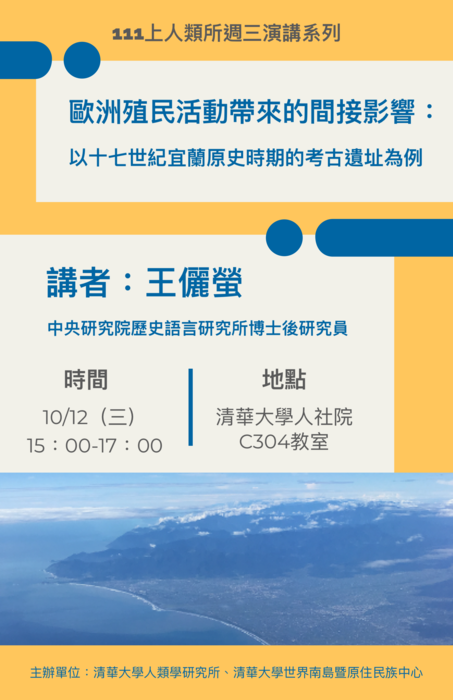European colonization and their Indirect Effects: A case study from protohistoric northeastern Taiwan during the 17th century

Speaker:
Li-Ying Wang (Postdoctoral Fellow, Institute of History and Philology, Academia Sinica)
Date: 10/12(Wed)
Time: 15:00 - 17:00
Location: NTHU HSS C304
European expansion from the 15th to 19th centuries often had substantial impacts on local Indigenous societies. However, for some places at the periphery of colonial centers, European colonial power was weak. These indirect effects of colonization are still not well understood. Kiwulan (AD 1350-1850), a major late Iron age site in northeastern Taiwan, provides a unique example to explore the indirect effect of European colonization due to the frequent trade activities during the European colonial period in the 17th century. In this study, I examined changes in different types of archaeological materials such as trade ornaments, locally made pottery, and burial networks using spatial analysis, geometric morphometrics, and network modeling. The result suggests a local experience of both cultural persistence and changes in a pericolonial context. This study also demonstrates an open science approach to improve research reproducibility.
Li-Ying Wang (Postdoctoral Fellow, Institute of History and Philology, Academia Sinica)
Date: 10/12(Wed)
Time: 15:00 - 17:00
Location: NTHU HSS C304
European expansion from the 15th to 19th centuries often had substantial impacts on local Indigenous societies. However, for some places at the periphery of colonial centers, European colonial power was weak. These indirect effects of colonization are still not well understood. Kiwulan (AD 1350-1850), a major late Iron age site in northeastern Taiwan, provides a unique example to explore the indirect effect of European colonization due to the frequent trade activities during the European colonial period in the 17th century. In this study, I examined changes in different types of archaeological materials such as trade ornaments, locally made pottery, and burial networks using spatial analysis, geometric morphometrics, and network modeling. The result suggests a local experience of both cultural persistence and changes in a pericolonial context. This study also demonstrates an open science approach to improve research reproducibility.
